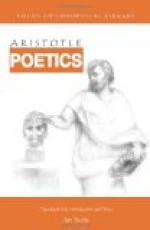The diction should be elaborated in the pauses of the action, where there is no expression of character or thought. For, conversely, character and thought are merely obscured by a diction that is over brilliant.
XXV
With respect to critical difficulties and their solutions, the number and nature of the sources from which they may be drawn may be thus exhibited.
The poet being an imitator, like a painter or any other artist, must of necessity imitate one of three objects,—things as they were or are, things as they are said or thought to be, or things as they ought to be. The vehicle of expression is language,—either current terms or, it may be, rare words or metaphors. There are also many modifications of language, which we concede to the poets. Add to this, that the standard of correctness is not the same in poetry and politics, any more than in poetry and any other art. Within the art of poetry itself there are two kinds of faults, those which touch its essence, and those which are accidental. If a poet has chosen to imitate something, but has imitated it incorrectly through want of capacity, the error is inherent in the poetry. But if the failure is due to a wrong choice if he has represented a horse as throwing out both his off legs at once, or introduced technical inaccuracies in medicine, for example, or in any other art the error is not essential to the poetry. These are the points of view from which we should consider and answer the objections raised by the critics.
First as to matters which concern the poet’s own art. If he describes the impossible, he is guilty of an error; but the error may be justified, if the end of the art be thereby attained (the end being that already mentioned), if, that is, the effect of this or any other part of the poem is thus rendered more striking. A case in point is the pursuit of Hector. If, however, the end might have been as well, or better, attained without violating the special rules of the poetic art, the error is not justified: for every kind of error should, if possible, be avoided.
Again, does the error touch the essentials of the poetic art, or some accident of it? For example,—not to know that a hind has no horns is a less serious matter than to paint it inartistically.




